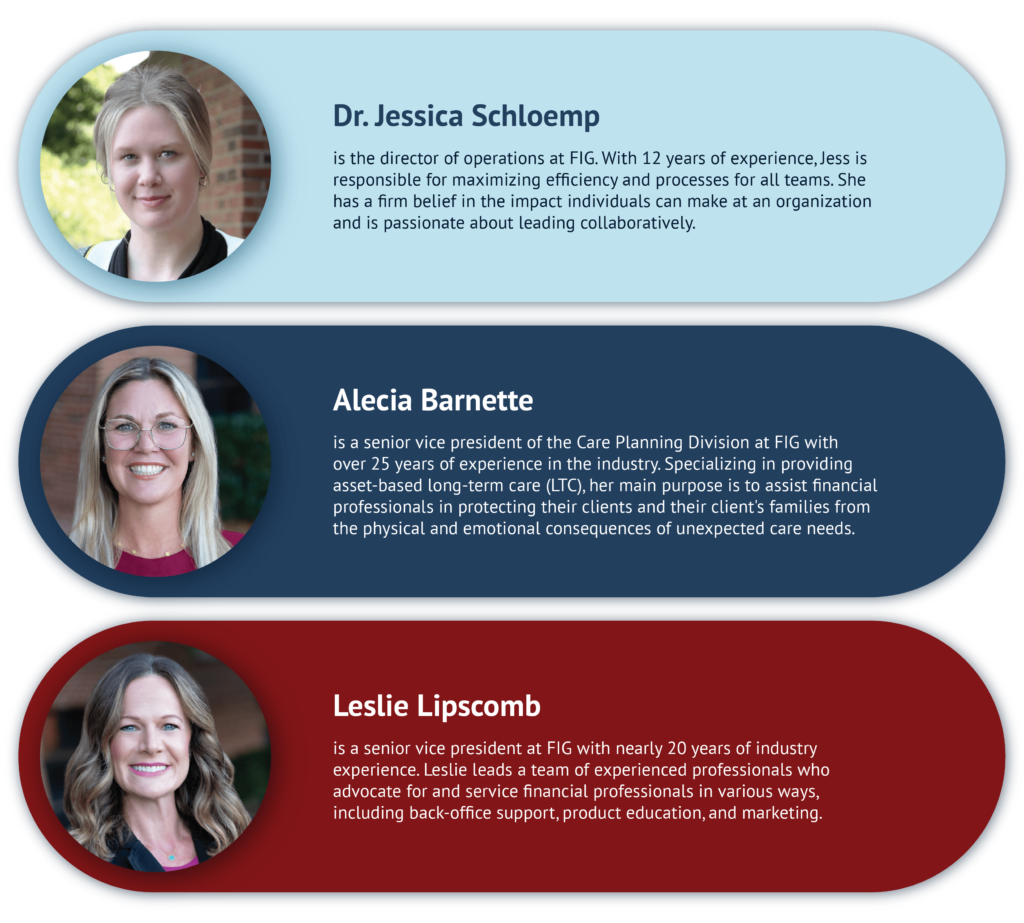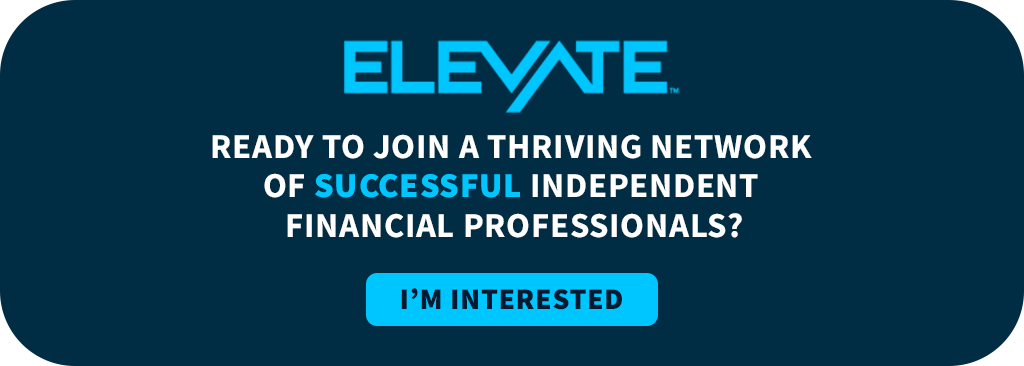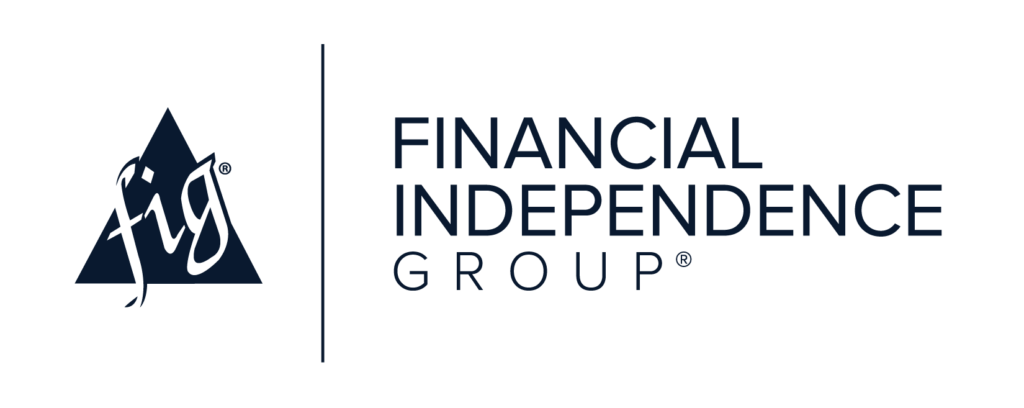March is National Women’s History Month, a time when we commemorate the incredible contributions of women who’ve made their mark on the finance industry.
Successful organizations are starting to see the call for diversity and inclusion as not just a buzzword but as a transformative force that can drive success in their businesses. In fact, studies show that equal gender representation can increase a business’s profitability and productivity by 40%.
So, what can financial professionals and business owners do to foster a collaborative environment for female trailblazers? What do aspiring young women entering a career in finance need to know?
There are no better people to answer these questions than three influential women here at Financial Independence Group (FIG). That’s why we engaged in an insightful discussion to learn more about the impact of mentorship and glean advice for all financial professionals.
Before we dive in, let’s meet our leaders.
Meet FIG’s Influential Leaders

Breaking Into the Industry: The Power of Community
As women forge paths in the finance industry, where their representation is still evolving, beginning a career can be exciting and challenging. Our accomplished female leaders say that mentorship was paramount at the start of their journeys.
“Navigating a new career, especially a new industry…you can’t do it alone!” says Jess Schloemp, who entered the world of finance as a means to get out of retail. She heard about an opening in operations from a friend and was soon processing 1035 exchanges for life insurance.
“I was young and naïve, but I did have a few people who took an interest in my growth. Within three months of doing 1035 transfers, I moved over to case management.”
Alecia Barnette, whose father inspired her career in finance, also highlighted the importance of community.
“Community and mentorship are key to your professional development,” she says. “This allows you to network and learn with other women who are doing the same things you’re doing day in and day out in your career.”
Their experience parallels that of many young professionals breaking into the industry, as 67% of women rate having a mentor as extremely important to their career advancement.
Additionally, mentoring programs are reported to improve promotion and retention rates for minorities and women from 15-38%.
Still, not all companies have established mentorship programs in place. How, then, can young professionals seek out mentorship?
Cultivating Connections: The Art of Purposeful Mentorship
“Mentorship has been a big part of my professional development at FIG.”
Leslie Lipscomb says she continues to learn from her mentor to this day. However, she acknowledges that not every company has a formal mentorship program and shares some advice:
“My advice for anyone seeking a mentor is don’t be afraid to ask the person you want to be your mentor to be your mentor. Make sure you understand the areas of professional development you want to focus on when you ask for help.” Being intentional with mentorship conversations and specific about goals makes the relationship more meaningful.
She also recommends leveraging technology to build and nurture a mentorship relationship. “Don’t just count on face-to-face meetings with your mentor limited to once or twice a month. Text, send a voice memo, or email. Connecting with your mentor through these channels will give any mentee the chance to leverage their mentor in real-time situations.”
Related: [PODCAST] Empowering Financial Futures: Leslie Lipscomb’s Journey at FIG
Mentorship doesn’t just benefit the mentee. In fact, those who serve as mentors report experiencing less anxiety and describe their jobs as being more meaningful compared to those who don’t mentor.
Jess advises that even without a formal mentorship relationship, you can learn something from all your interactions with leaders around you, good and bad. She says, “Taking time to self-reflect on those interactions and the person you aspire to be is critical…define your brand and seek out people who support that.”
Guidance for Emerging Female Financial Professionals
According to Alecia, one of the most important things a young female professional can do, in addition to obtaining as much education as possible, is to surround themselves with a network of women who support, grow, and challenge one another.
“There are a ton of all-women conferences,” she says. “Try to attend and find like-minded individuals. If you’re going to work for a firm, make sure they’re a big advocate of women in the financial services industry. It’s good to have male advocates as well as female advocates.”
Leslie places importance on continuous learning and curiosity, saying that she spent most of her time early in her career reading, studying, and leveraging the experienced people around her and was unafraid to tackle complex cases.
“My response to many questions early in my career was, ‘I don’t know, but I will find out and get back to you.‘ People always respected the fact that I didn’t give them bad information and knew I was going to take the time to research the particular topic.”
Jess’s advice for young financial professionals echoes a woman leader she met early in her career, and it’s something she’s never forgotten. She quotes her, “Capitalize on your traits and the things you bring to the table. It’s tempting to try to fit in with ‘the boys club,’ but be authentically you. You’ll get further focusing on youversus fitting in.” After 12 years, “I believe that to be true.”
Jess also recommends proactively asking for feedback. “If something were challenging, I would ask for feedback and specifics on how to improve. Or ask deeper questions around expectations and desired outcomes.”
By posing insightful questions, embracing continuous learning, and cultivating connections within a network of similarly driven professionals, young women forge paths to success in the industry.
Bridging the Gap: How Organizations Have Evolved
“The landscape of ladies leading in financial services has grown like wildfire in the last five years,” Leslie says. “When I started in this industry, my female client base consisted of maybe five women; however, today, we serve well over fifty women!”
Alecia also mentions seeing a shifting of tides in the industry. “A lot of companies have implemented diversity and inclusion initiatives and are trying to recruit, retain, and advance women in the industry. They’re starting to recognize the importance of work-life balance. This is allowing more women to juggle career responsibilities and family commitment.”
Leadership also plays a pivotal role in the way organizations have created a more inclusive environment. Jess says she always leads by example, “I’m consistently asking our team questions and encouraging them to do the same. We also have a proactive way within ‘collab crews’ where our team breaks out into smaller groups and talks about efficiencies and how to make our team, FIG, and the industry better. Consistency is key: if you continue to emulate this behavior, the team will join!”
Related: [PODCAST] Empowerment and Leadership with Jessica Schloemp and Arron Price
Connecting with Clients: Advice for Financial Professionals
Financial professionals have the opportunity and responsibility to create an inclusive environment not just for their team members but also with clients. One way to accomplish this is by actively involving both spouses in the financial conversation.
Leslie advises to never assume that the woman isn’t the breadwinner when meeting with a couple for the first time. She reminds financial professionals to address both parties and be mindful of who they look at the most when speaking. “More and more women have the desire to be a part of the planning conversation.”
Jess recommends that financial professionals be more intentional with the types of questions they ask. She says, “Many women are subject to different responsibilities, hardships, and concerns than men, such as long-term care, taking care of family members…it’s important that we set everyone up for success.”
Care planning is just one of the vital subjects financial professionals can acknowledge in an effort to address clients’ diverse challenges, especially considering many women take on the caregiving role. Research shows that women aged 50 and older who leave their jobs to care for a family member lose an average of nearly $324,004 in wages and benefits over their lifetime.
As the SVP of care planning, Alecia is passionate about helping financial professionals understand the value of the care planning conversation, both in enhancing their business and providing a valuable service to clients. She says, “Helping clients understand the emotional consequences of not having a plan in place has made it easier for more financial professionals to start implementing care planning into their practice.”
Through these intentional conversations, financial professionals can create a safe space where all their clients feel valued.
Related: Why Care Planning is Vital to a Financial Professional’s Business
Join the Movement
“Joining a firm like FIG, which has a women’s coaching program and is a big advocate of women in the financial services industry, is a must.”
– Alecia Barnette
The journey of these remarkable women serves as a testament to the transformative power of mentorship and continuous learning. By breaking into the industry with resilience and seeking guidance from mentors, they have not only overcome challenges but have also paved the way for others.
If you’re a financial professional looking to plug into a network of like-minded professionals, marketing coaches, industry thought leaders, and mentors, then you might be a good fit for our Elevate program.
Elevate includes exclusive events where financial professionals can bring their unique backgrounds and experiences to the table to learn, grow, and celebrate with one another. Connect with us today to learn how you can gain the resources you need to experience powerful business growth.


